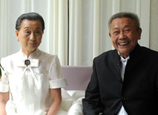
TOKYO, July 5 (Xinhua) -- Japan's Prime Minister Shinzo Abe on Thursday asserted that Japan's economy has improved under his Liberal Democratic Party's administration, but as parties ramp-up campaigns for the July 21 upper house election, opposition parties and economists have taken aim at Abe's economic policies dubbed " Abenomics."
Abe, known as a fiscal hawk, has rolled-out an ambitious plan to revive Japan's sluggish economy and reverse decades of deflation.
"We are at the entrance of economic recovery. If we change this, we will lose everything," Abe, who along with his New Komeito Party ally is looking to gain control of the upper house of parliament, said at a stump speech earlier Friday in Tokyo.
The prime minister, since official campaigning for the 122 seats up for grabs in the smaller 242 seat upper chamber, has been waxing lyrical about the need to bring an end to a "twisted" parliament in which the opposition bloc currently hold a majority in the upper chamber of Japan's bicameral system of parliament.
Currently, the LDP has 50 seats in the upper house of parliament that will go uncontested, while their ally New Komeito has nine, giving them a total of 59. They will jointly need to win 63 seats in the upcoming election to gain a majority.
The nation's leader, under his "Abenomics" economic mantra has stated that the LDP "will win the election and end the twisted parliament and deliver visible results.
Highlighting Japan's 4.1 percent annual economic growth rate in the first quarter of this year, the prime minister is insisting that under his administration and with autonomy in the upper house to swiftly pass new legislation -- avoiding the logjams that have plagued the divided Diet for decades -- he will usher in a new era of prosperity in Japan through his policy initiatives.
But Abe's detractors, comprising not just opposition leaders like the Democratic Party of Japan's (DPJ) chief Banri Kaieda, but also senior economists around the world, are concerned that " Abenomics" may be more of a buzzword to lure and galvanize a nation largely apathetic in the wake of broken pledges made by the DPJ.
The DPJ was ousted after just three years in power by the LDP, which won a clear majority in the lower house general election on December 16, 2012.
Economists are saying that far more details and execution are now necessary for Abe's strategy to be successful. They caution that mere rhetoric will only pacify the electorate and his own party factions for so long, before there's a backlash.

















 'Prince's cool idea in summer': Carving on watermelon to boost sales
'Prince's cool idea in summer': Carving on watermelon to boost sales


![]()
